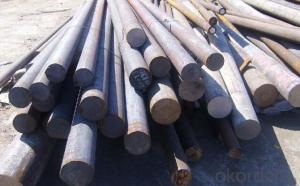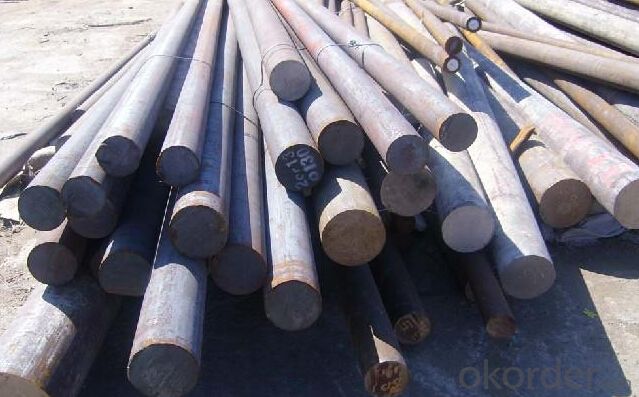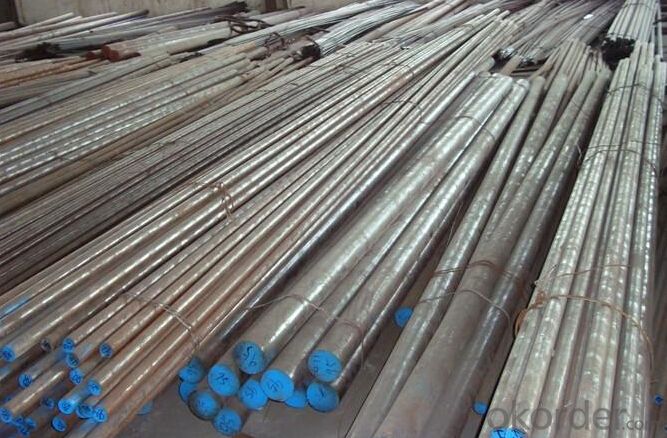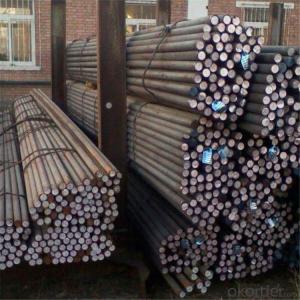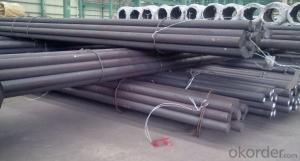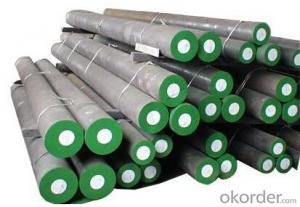Grade S48C CNBM Hot Rolled Alloy Steel Bar
- Loading Port:
- Shanghai
- Payment Terms:
- TT OR LC
- Min Order Qty:
- 3 m.t.
- Supply Capability:
- 10000 m.t./month
OKorder Service Pledge
OKorder Financial Service
You Might Also Like
Specification
Specifications of Steel Round Rod Bar:
Material | S48C | Round bar | Dia(mm) | 16-600 |
Process | EAF + LF + VD + Forged + Heat Treatment (optional) | Length (mm) | Max 12000 | |
Heat treatment | Normalized / Annealed / Quenched / tempered | Flat bar | Thickness(mm) | 8-500 |
Delivery condition | Hot forged +Rough machined (black surface after Q/T)+ Turned (optional) | Width(mm) | 70-200 | |
Test | Ultrasonic test according to SEP 1921-84 D/d | Length (mm) | Max 12000 | |
Chemical Composition:
C | Si | Mn | Cr | Mo |
0.26~0.34 | 0.17~0.37 | 0.40~0.70 | 0.80~1.10 | 0.15~0.25 |
Usage and Applications:
used for manufacturing the forging that have higher strength
and tempering section, just like the gear wheel used for
locomotive traction,booster Transmissioon gear,back
axle.connecting rod that have heavy loadign,and spring
clip,it can also used for tool joint of oil deep well under
2000meters and fishing tool.
Packaging & Delivery:
Packaging Detail: Standard seaworthy packing or as customer required; all goods are packed in bundle with steel strips and shipped by break bulk vessel or container
Delivery Detail: 45 days
Production Flow:
EAF+LF+VD+ Forged+ Heat Treatment
Material prepare (billet) — heat up — rough rolling — precision rolling — cooling — packing — storage and transportation
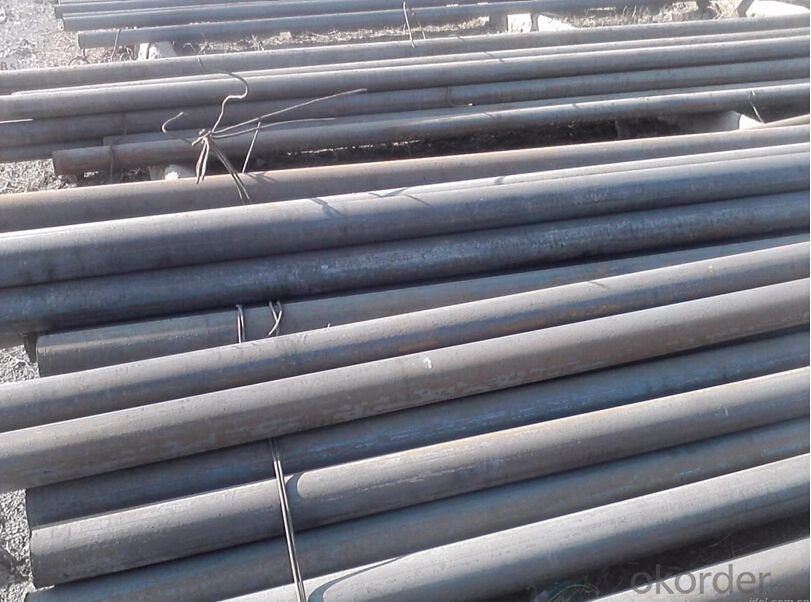
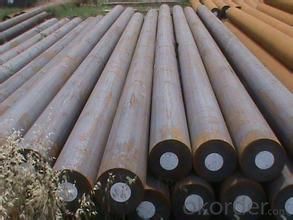
Quality Assurance:
1. We will strictly inspect our production that we sold according to the customer’s request.
2. Our steel reaches international quality standards.
3. Quality should be in conformity with the specification of the manufacturer. Quantity and packing conditions should be in conformity with the term in the contract.
4. Should the packing found damaged, the buyer has the right to claim to the seller
- Q: How does special steel perform in high-temperature mechanical applications?
- Special steel performs exceptionally well in high-temperature mechanical applications. Thanks to its unique composition and properties, such as high strength, excellent heat resistance, and thermal stability, special steel can withstand extreme temperatures without losing its structural integrity or mechanical properties. It exhibits minimal creep, oxidation, and deformation, ensuring reliable performance and durability in demanding high-temperature environments.
- Q: Can special steel be used in the power transmission industry?
- Yes, special steel can be used in the power transmission industry. Special steel alloys offer enhanced strength, durability, and resistance to wear and corrosion, making them suitable for various components in power transmission equipment such as gears, shafts, bearings, and connectors. These alloys can withstand high loads, extreme temperatures, and harsh environmental conditions, ensuring reliable performance and longevity in power transmission applications.
- Q: How is stainless tool steel used in the manufacturing of surgical instruments?
- Stainless tool steel is commonly used in the manufacturing of surgical instruments due to its desirable properties such as high corrosion resistance, durability, and ease of sterilization. It provides the necessary strength and precision required for surgical tools, ensuring their longevity and performance in various medical procedures. Additionally, stainless tool steel can withstand repeated exposure to sterilization methods like autoclaving, making it a reliable choice for surgical instrument manufacturing.
- Q: What are the main advantages of using special steel in the mining industry?
- The main advantages of using special steel in the mining industry are its exceptional strength, durability, and resistance to wear and corrosion. This allows for the construction of heavy-duty equipment and machinery that can withstand the harsh and demanding conditions of mining operations. Special steel also has the ability to retain its properties at high temperatures, making it suitable for applications such as drilling and cutting through tough materials. Additionally, it offers increased safety by minimizing the risk of equipment failure, ensuring a more efficient and productive mining process.
- Q: What are the requirements for special steel used in energy equipment manufacturing?
- Special steel used in the manufacturing of energy equipment must meet stringent and specific requirements. These steels need to possess certain characteristics that make them suitable for handling the extreme conditions and demands of energy equipment. To begin with, high strength is a crucial requirement for special steel used in energy equipment manufacturing. These steels must have excellent mechanical properties, such as high tensile strength and good toughness. This is necessary to withstand the heavy loads, pressure, and stresses experienced by energy equipment like turbines, generators, and power transmission systems. Additionally, special steels used in energy equipment manufacturing must demonstrate exceptional heat resistance. They must maintain their structural integrity and mechanical properties even at elevated temperatures. This is especially important for components like boiler tubes and heat exchangers, as energy equipment operates under high-temperature conditions. Heat-resistant steels with high melting points and low thermal expansion are therefore essential. Corrosion resistance is another vital requirement for special steel used in energy equipment manufacturing. Energy equipment is often exposed to harsh environments, including corrosive gases, fluids, and high humidity. Therefore, the special steels used should have excellent resistance to corrosion, oxidation, and erosion. This ensures the longevity and reliability of the energy equipment, reducing maintenance and replacement costs. Moreover, special steels used in energy equipment manufacturing should possess good weldability and machinability. Energy equipment often requires complex fabrication processes and weldments. Therefore, these steels should have good weldability to ensure easy and reliable joining. Similarly, machinability is crucial for the production of energy equipment components, as it allows for efficient shaping and finishing. Lastly, special steel used in energy equipment manufacturing must meet strict quality and safety standards. They should adhere to international codes and regulations, such as those established by organizations like the American Society of Mechanical Engineers (ASME) and the International Electrotechnical Commission (IEC). These standards guarantee that the special steels meet the necessary specifications and performance requirements for energy equipment, promoting safety and reliability. In conclusion, the requirements for special steel used in energy equipment manufacturing encompass high strength, heat resistance, corrosion resistance, weldability, machinability, and compliance with quality and safety standards. By meeting these requirements, the special steels can withstand the extreme conditions and demands of energy equipment, ensuring their longevity, reliability, and safety.
- Q: Can special steel be used for making chemical processing equipment?
- Yes, special steel can be used for making chemical processing equipment. Special steel, such as stainless steel or corrosion-resistant alloys, are commonly used in the construction of chemical processing equipment due to their excellent resistance to corrosion, high temperature and pressure, and ability to withstand harsh chemical environments.
- Q: How does special steel contribute to the manufacturing aftermarket industry?
- Special steel contributes to the manufacturing aftermarket industry by providing high-quality materials that are crucial for producing durable and reliable aftermarket parts and components. Its unique properties, such as increased strength, corrosion resistance, and heat resistance, make it ideal for manufacturing aftermarket products that need to withstand demanding conditions. Additionally, special steel's versatility and ability to be machined into complex shapes allow manufacturers to create customized aftermarket solutions, enhancing performance and extending the lifespan of various industrial machinery and equipment.
- Q: What are the properties of low alloy steel?
- Low alloy steel possesses a combination of improved strength, toughness, and corrosion resistance compared to regular carbon steel. It contains a small amount of alloying elements (such as manganese, nickel, chromium, or molybdenum) that enhance its mechanical properties. Additionally, low alloy steel has the advantage of being more cost-effective than high alloy steels, making it a popular choice in various industries.
- Q: How is special steel used in the production of bearings for high-speed applications?
- Special steel is extensively used in the production of bearings for high-speed applications due to its unique properties that make it ideal for such demanding conditions. Bearings play a critical role in facilitating smooth and efficient movement between two surfaces, and high-speed applications require bearings to withstand extreme forces and rotational speeds. In order to meet these requirements, special steel is chosen for its exceptional strength, durability, and wear resistance. The composition of special steel allows it to maintain its structural integrity even under high loads, preventing deformation and ensuring the longevity of the bearing. Additionally, special steel possesses excellent hardness and toughness, enabling it to resist wear and fatigue caused by repetitive high-speed rotations. This property is crucial in high-speed applications where continuous motion can generate significant heat and friction, leading to premature wear and failure of the bearing. The use of special steel helps to minimize these issues and ensures reliable and efficient performance. Furthermore, special steel has superior heat resistance, which is vital in high-speed applications where temperatures can rise due to friction and high rotational speeds. The ability of special steel to withstand elevated temperatures without losing its mechanical properties or deforming is crucial for preventing premature failure of the bearing and ensuring long-term performance. In summary, special steel is an essential material in the production of bearings for high-speed applications due to its exceptional strength, durability, wear resistance, and heat resistance. These properties allow bearings to operate reliably and efficiently even under extreme conditions, ensuring smooth movement and minimizing the risk of premature failure.
- Q: What are the requirements for special steel used in high-strength applications?
- The requirements for special steel used in high-strength applications typically include high tensile strength, excellent toughness, good corrosion resistance, and the ability to withstand extreme temperatures. Additionally, the steel must possess good weldability and formability to facilitate the manufacturing process. Furthermore, it should meet specific industry standards and specifications to ensure its suitability for the intended application.
Send your message to us
Grade S48C CNBM Hot Rolled Alloy Steel Bar
- Loading Port:
- Shanghai
- Payment Terms:
- TT OR LC
- Min Order Qty:
- 3 m.t.
- Supply Capability:
- 10000 m.t./month
OKorder Service Pledge
OKorder Financial Service
Similar products
Hot products
Hot Searches
Related keywords
